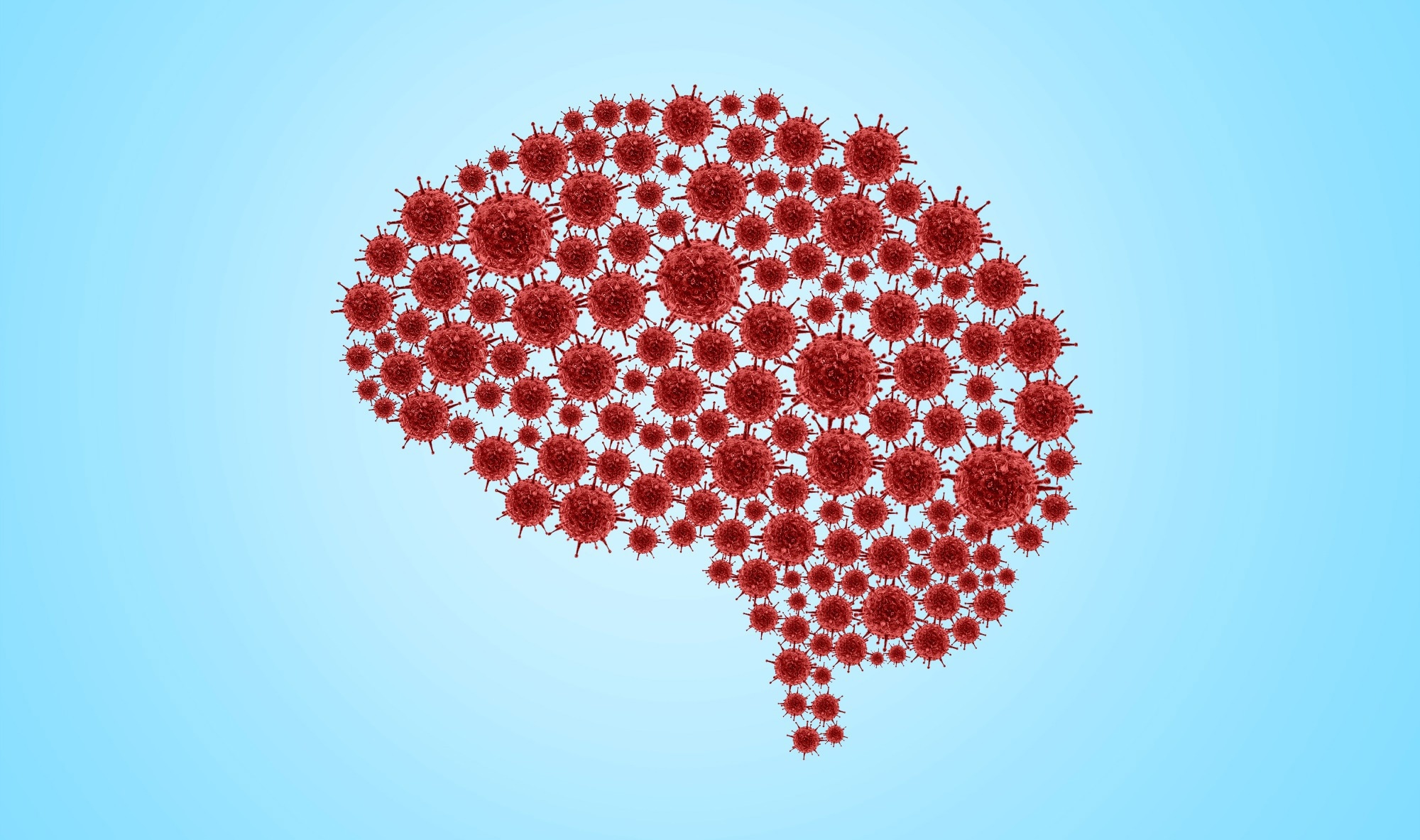In a recent study published in the journal Molecular & Cellular Proteomics, researchers analyzed the proteins in cerebrospinal fluid (CSF) samples obtained from African green monkeys and rhesus macaques infected with severe acute respiratory syndrome coronavirus 2 (SARS-CoV-2 to understand the neurological manifestations of coronavirus disease 2019 (COVID-19).
 Study: Cerebrospinal Fluid Protein Markers Indicate Neuro-Damage in SARS-CoV-2-Infected Nonhuman Primates. Image Credit: DOERS / Shutterstock
Study: Cerebrospinal Fluid Protein Markers Indicate Neuro-Damage in SARS-CoV-2-Infected Nonhuman Primates. Image Credit: DOERS / Shutterstock
Background
The manifestations of SARS-CoV-2 infections range from asymptomatic or mildly symptomatic to severe respiratory infections leading to pneumonia, lung injury, and even death. However, a growing body of evidence suggests that clinical outcomes of COVID-19 are not restricted to the respiratory system, neurological symptoms, including dizziness, anosmia, dysgeusia, and headaches in the early stages, and seizures, delirium, and meningoencephalitis in more severe cases, have been observed.
While more chronic neurological complications have been associated with severe COVID-19 cases, cognitive impairment has also been observed in mild cases. The use of mass spectrometry in investigating the proteins in CSF has proven to be an efficient method for understanding the mechanisms of neurodegenerative disorders. Cerebrospinal fluid is an ideal sample choice since obtaining it is comparatively less risky and invasive than biopsies of the brain. It contains the proteins secreted by all the regions and cell types of the central nervous system (CNS), eliminating the issue of sampling bias.
About the study
In the present study, the researchers used CSF samples from two non-human primate models — African green monkeys and rhesus macaques — infected with SARS-CoV-2 to conduct mass spectrometric analysis of the CSF proteins to understand the neurologic effects of COVID-19. The non-human primates were infected with the 2019-nCoV/USA-WA1/2020 strain of SARS-CoV-2 via aerosol exposure or inoculation, and nasal swabs were tested for SARS-CoV-2 nucleocapsid protein to confirm infection establishment.
Two African green monkeys and two rhesus macaques were used as age-matched controls, and a negative SARS-CoV-2 test for all the animals was ensured before the commencement of the study. Whole blood and aseptic CSF were obtained from all the animals after being infected with SARS-CoV-2.
The CSF samples were subjected to protein extraction, digestion with trypsin, peptide enrichment, and strong-cation exchange chromatography fractionation to prepare the samples for mass spectrometry. Liquid chromatography-mass spectrometry acquisition of the samples was followed by quantifying and identifying the CSF proteins. The dysregulated proteins were mapped to the human brain, and the diseased pathways were identified and analyzed.
Additionally, sections of the cerebellum, brain stem, and basal ganglia were analyzed using immunohistochemistry, while additional sections of the CNS, such as the temporal, occipital, parietal, and frontal lobes and upper, lower, intermediate, and middle lobes of the lungs were used to quantify the CNS and pulmonary pathologies in non-human primates infected with SARS-CoV-2. Enzyme-linked immunosorbent assays (ELISA) were also conducted to analyze the plasma matrix metalloproteinase-2.
Results
The results reported that the animals exhibited very low levels of pulmonary pathology, but the CNS pathology levels were moderate to severe. In addition, there were substantial differences in the CSF proteome of the infected animals and their uninfected controls, with the changes corresponding to an abundance of bronchial virus in the early stages of the infection and a change in the secretion of CNS factors indicating neuropathy associated with the SARS-CoV-2 infection.
Additionally, the scattered distribution of the data from the infected animals compared to the uninfected controls suggested that the CSF proteome changes and the host's response to the viral infection were heterogeneous. Moreover, the dysregulated proteins in the CSF were found to be enriched preferentially in pathways associated with hemostasis, human neurodegenerative disease, and innate pathways that could influence the inflammatory response following COVID-19. Mapping of the dysregulated proteins using the Human Brain Protein Atlas also showed that these proteins were enriched in the regions of the brain that exhibit injury frequently after COVID-19.
Conclusions
Overall, the results suggested that the changes in the CSF proteins detected in the non-human primate models infected with SARS-CoV-2 were linked to biochemical and functional pathways associated with innate immunity, thrombus formation, cellular infiltration, and progressive neurological conditions, and these pathways could potentially be used as therapeutic targets to reduce or prevent the neurological outcomes of COVID-19.
Journal reference:
- Maity, S., Mayer, M. G., Shu, Q., Linh, H., Bao, D., Blair, R. V., He, Y., Lyon, C. J., Hu, T. Y., Fischer, T., & Fan, J. (2023). Cerebrospinal Fluid Protein Markers Indicate Neuro-Damage in SARS-CoV-2-Infected Non-human Primates. Molecular & Cellular Proteomics, 22(4), 100523. https://doi.org/10.1016/j.mcpro.2023.100523